Residential MPH Students Share Their Independent Integrated Learning Experience Projects
"The Independent Integrated Learning Experience gives students three consecutive terms to explore an area that is of personal interest. They get to choose the topic, choose the format (manuscript, research proposal, or policy paper) and iteratively consolidate what they learn across the curriculum."
- Margaret V Mulley, Dartmouth Lecturer and ILE Course Co-Director
"The goal is to help students develop a growth mindset by following their interests and curiosity as they apply new skills and knowledge both practically and purposefully. More simply put, our hope is that students will find a vocation that lasts a lifetime."
- Albert Mulley, MD, MPP, Dartmouth Professor and ILE Course Co-Director
Continue reading to discover more about the ILE projects of five MPH students and how Dartmouth has influenced their approach and perspective on research.
- The impact of social connections on the well-being of rural older adults amid the COVID-19 pandemic
- The occupational hazards faced by commercial and military pilots due to their exposure to ultraviolet radiation (UVR) and cosmic ionizing radiation (CIR) during flight
- The literature on factors influencing investment into public health resources for wild-type poliovirus 1(WPV1) eradication in Afghanistan, India, and Pakistan and focuses on geography, government type, and geopolitical status and how these nuanced factors guide national eradication efforts and long-term support strategies
- Mitigating the impacts of broad, imprecise economic sanctions on health and quality of life in Iran
- Assessing the level of preparedness and shared decision-making experiences among individuals with advanced Chronic Kidney Disease (CKD) and their caregivers through a cross-sectional survey
Alondra Ramos MPH ‘24 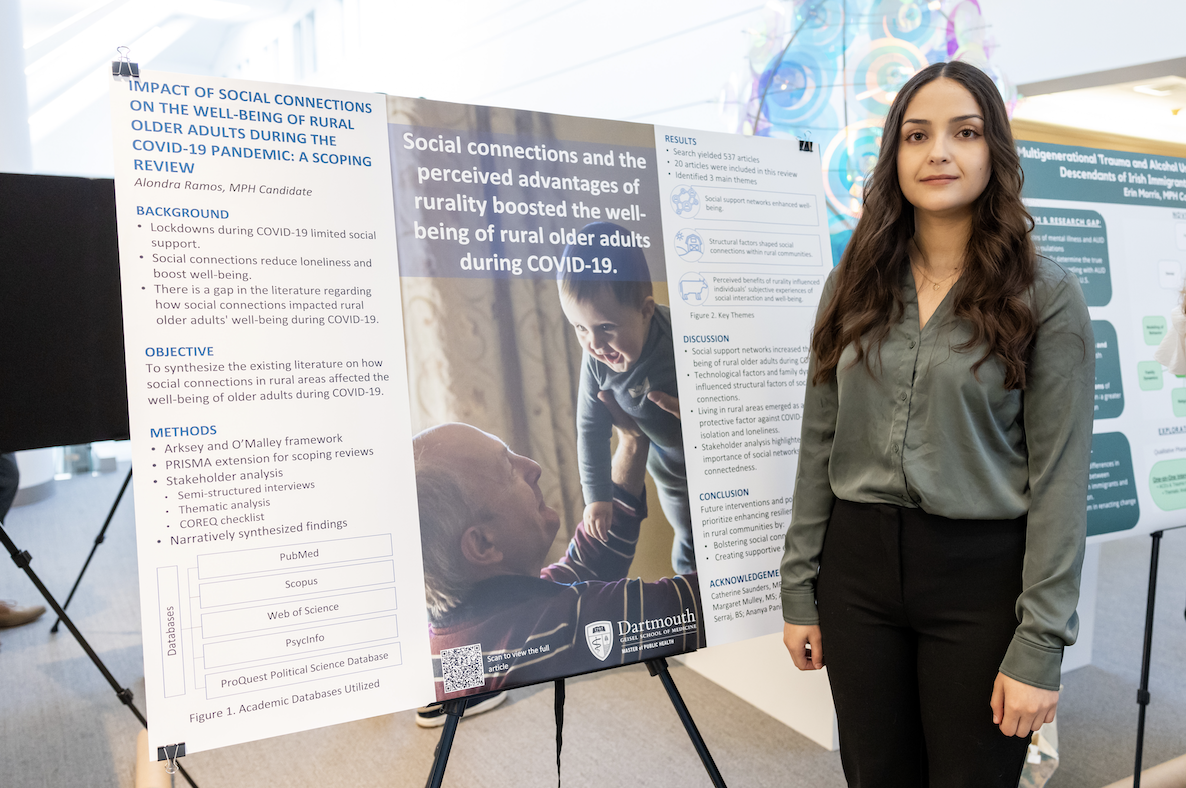
MPH candidate Ramos' scoping review delves into the impact of social connections on the well-being of rural older adults amid the COVID-19 pandemic.
Analyzing studies published between 2020-2024, Ramos identified three primary themes: 1) social support networks enhanced well-being, 2) structural factors shaped social connections within rural communities, and 3) perceived benefits of rurality influenced individuals' subjective experiences of social interaction and well-being. Additionally, stakeholder interviews with individuals who worked with older adults during COVID-19 provided valuable insights into the challenges and opportunities faced by this population. Ramos notes that findings highlight the importance of maintaining and strengthening social connections and leveraging the strengths of rural communities to promote the overall well-being of older adults, especially during times of crisis.
Despite challenges like the digital divide, several studies revealed that older adults in rural areas utilized technology, such as social media and messaging apps, to maintain and strengthen their social connections during the pandemic. This finding, supported by stakeholders' insights noting older adults' quick adaptation to technology despite common beliefs about technological challenges, underscores the adaptability and resilience of older adults in leveraging technology for social interaction and highlights a positive aspect of technology adoption in rural communities while challenging preconceived notions about technology usage among older adults.
"Studying at Dartmouth has broadened my perspective and helped me develop valuable skills. The supportive community and rigorous academics consistently motivate me to think more critically and embrace adaptability," says Ramos.
Noel Tufts MPH ‘24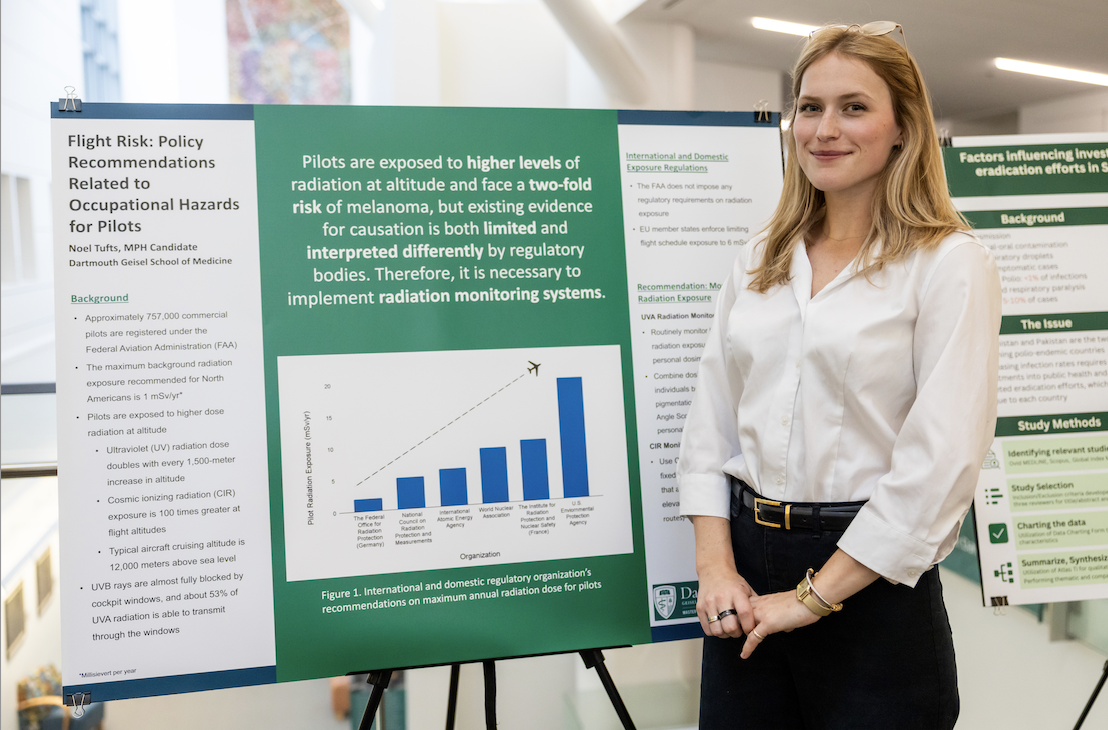
In her Dartmouth Independent Learning Experience policy proposal, Tufts explores the occupational hazards faced by commercial and military pilots due to their exposure to ultraviolet radiation (UVR) and cosmic ionizing radiation (CIR) during flight. With approximately 757,000 commercial pilots and 28,000 military pilots in the United States, Tufts feels that the risks associated with radiation exposure demand updated safety recommendations. Despite extensive research on the carcinogenic nature of UVR and CIR, there is no consensus on the exact exposure levels for pilots.
Pilots spend a significant amount of time seated in front of windows, exposing them to higher radiation levels, particularly at cruising altitudes of around 12,000 meters above sea level. Studies indicate a correlation between pilot radiation exposure and the increased incidence of melanoma in this population. While regulations vary internationally, the lack of legal requirements from the Federal Aviation Administration (FAA) in the U.S. poses challenges in ensuring pilot safety. Tufts’ policy proposal’s recommendations include implementing a radiation monitoring system, utilizing UVA and CIR dosimeters to track individual exposure levels, to gain a better understanding of the risks pilots face and promoting education and transparency to pilots regarding the risks. Efforts she feels are crucial for promoting health equity within the aviation industry and mitigating the hazards associated with radiation exposure for pilots.
“Dartmouth has provided me with the invaluable opportunity to collaborate with professionals from diverse backgrounds, thereby offering me new perspectives on health and wellness and fostering my growth as a public health specialist,” says Tufts. “The insights gained from my ILE research have empowered me to educate my father about the radiation hazards inherent in his role as a pilot. As a result, he has taken proactive steps to safeguard himself and has initiated discussions with his peers on adopting preventive measures to mitigate the risks of excessive radiation exposure.”
Sharanya Subramaniam MPH ‘24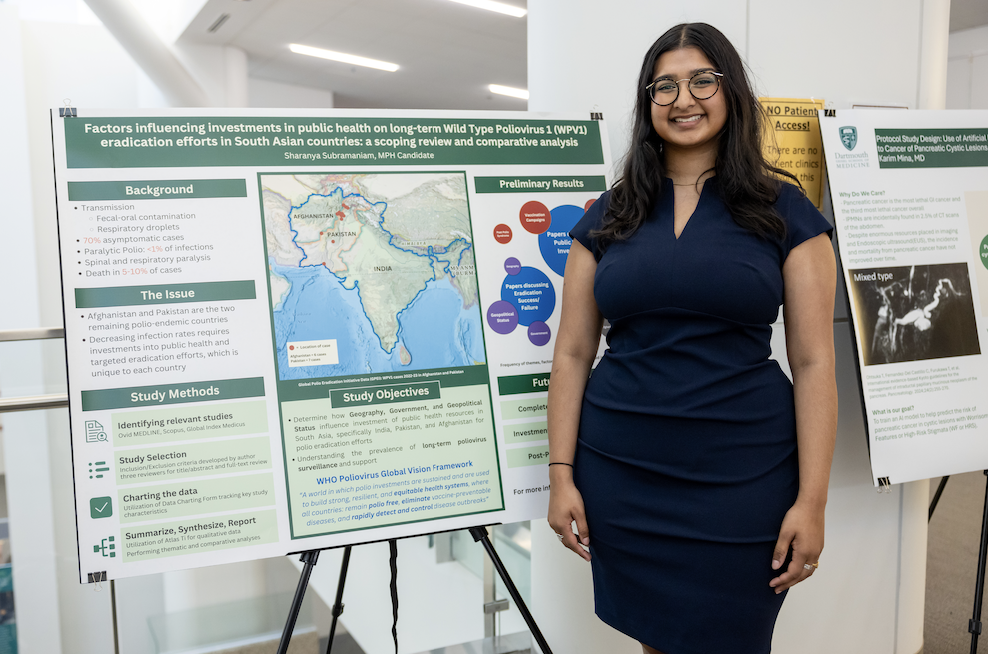
“My inspiration for this project comes from my father, a poliovirus survivor from India. Witnessing his everyday battle with the long-term effects of the virus has deeply influenced my interest in pursuing this research,” says MPH candidate Subramaniam. “I have turned this personal inspiration into a focused research project thanks to the plethora of resources available to me as a Dartmouth student.”
In their scoping review, Subramaniam examines the literature on factors influencing investment into public health resources for wild-type poliovirus 1(WPV1) eradication in Afghanistan, India, and Pakistan and focuses on geography, government type, and geopolitical status and how these nuanced factors guide national eradication efforts and long-term support strategies. Subramaniam notes that Pakistan and Afghanistan remain the last two countries that have yet to eradicate WPV1. In contrast, India, their neighboring country, was the most recent South Asian country to achieve eradication status in 2014. Their review aims to compare Afghanistan and Pakistan’s eradication efforts to India’s strategies and unravel the underlying reasons behind the disparity in polio eradication progress within the region.
“The accomplished faculty specializing in poliovirus and infectious diseases have provided invaluable guidance, while the extensive research support and resources offered by the MPH program have made it possible to pursue projects like this,” reflects Subramaniam.
Preliminary results indicate that in Afghanistan, geography and the state of their geopolitical climate are the two most common factors causing a delay in successful poliovirus eradication despite their continuous efforts over the past decade. Specifically, challenging terrain and remote areas make it difficult for vaccination teams to reach every child, especially in conflict zones and border regions where virus hotspots are. Additionally, historical misuse of medical campaigns for intelligence purposes and attacks on vaccination sites by Taliban rule causes mistrust of vaccination programs - crucial for Afghanistan’s final push towards eradication.
Subramaniam maintains that their work and engagement with Dartmouth continue to motivate their commitment to addressing public health challenges on a global scale.
Mina Shahinfar MPH ‘24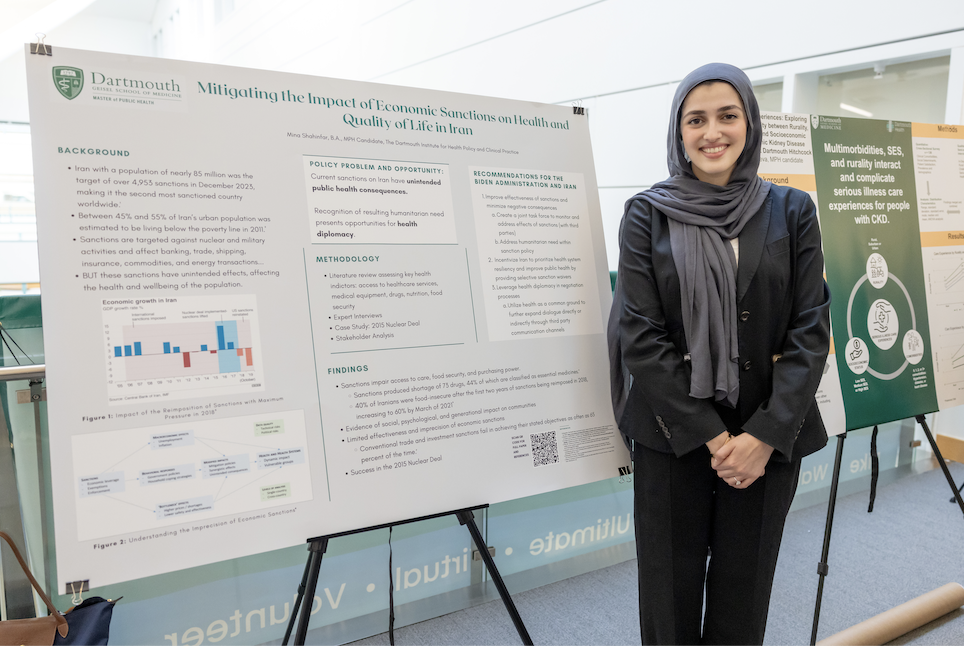
For their Independent Integrated Learning Experience, Dartmouth MPH candidate Shahinfar chose to complete a policy analysis looking at mitigating the impacts of broad, imprecise economic sanctions on health and quality of life in Iran. Iran, with a population of nearly 85 million, has been subject to international sanctions by various entities, including the United States, European Union, and United Nations, since the Islamic Revolution in 1979 – ranking it the second most sanctioned country worldwide. Sanctions against Iran primarily exist on nuclear and military activities and banking, trade, shipping, insurance, commodities, and energy transactions, which can produce unintended consequences affecting public health and wellbeing.
Shahinfar notes that sanctions impact Iran's healthcare system beyond economic impacts due to increased costs and issues in banking transfers, causing severe drug shortages and reduced access to medical devices and equipment. The burden of economic destabilization caused by sanctions could further contribute to inflation in the food market, resulting in increased rates of food insecurity and reductions in household purchasing power, impacting child development.
Based on their review of literature on health indicators and the effectiveness of sanctions, Shahinfar's paper recommends policy interventions leveraging previous negotiations to advocate for the application of health diplomacy and improved recognition of humanitarian needs in ongoing multilateral negotiations. By considering the public health impacts of sanctions, recommendations can be utilized to create humanitarian relief and improve the precision of economic sanctions to minimize negative consequences.
"My experience as a Dartmouth student has been challenging and incredibly rewarding, allowing me to study public health in many different subject areas, from human rights to international law and policy," says Shahinfar. "This project was special to me because I could study something I felt personally connected to as an Iranian-American student. Understanding the various determinants of health - particularly political determinants - made me realize how important it is to recognize unjust systems and institutions that threaten public health and wellbeing and advocate for more equitable policies."
Anji Zhu MPH ‘24
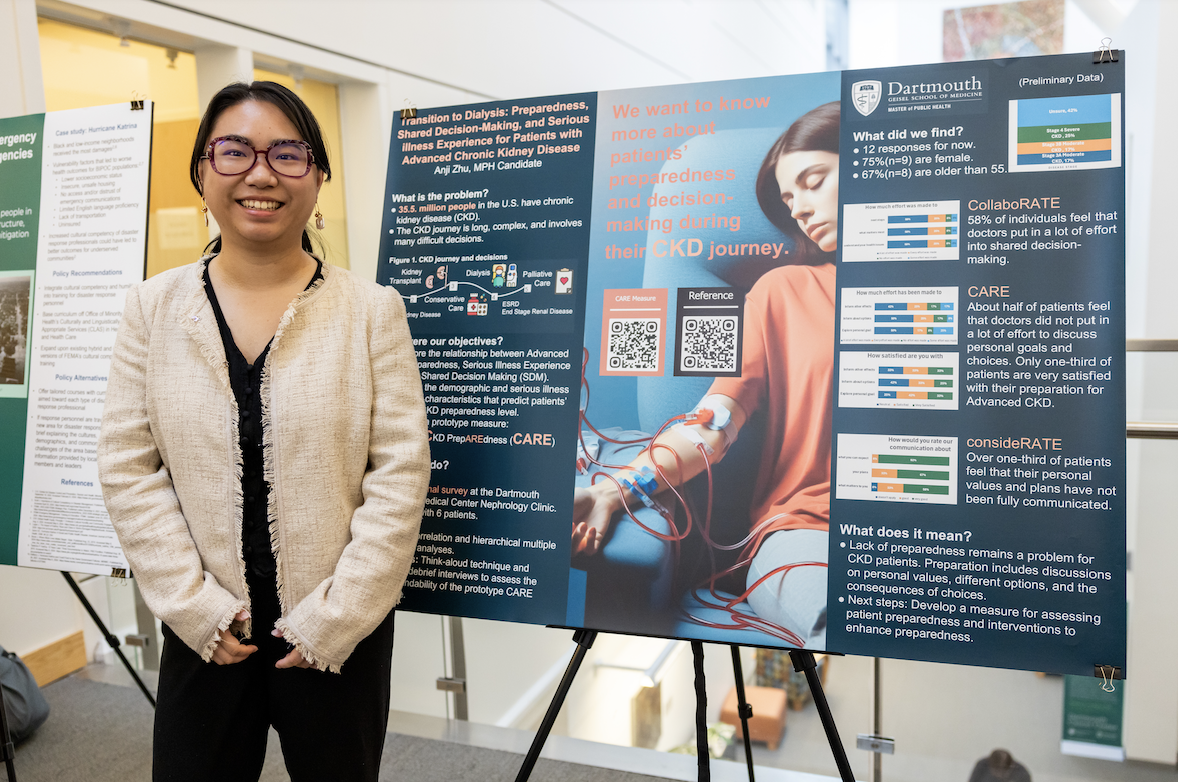 In this study, Dartmouth MPH candidate Zhu aims to assess the level of preparedness and shared decision-making experiences among individuals with advanced Chronic Kidney Disease (CKD) and their caregivers through a cross-sectional survey conducted at the New Hampshire Dartmouth Health (NHDH) Nephrology Clinic. Zhu also aims to develop an Advanced CKD Preparedness instrument to measure patients' readiness for transitioning to the next stage of therapy – exploring content validity by interviewing patients regarding their opinions on the measure’s questions.
In this study, Dartmouth MPH candidate Zhu aims to assess the level of preparedness and shared decision-making experiences among individuals with advanced Chronic Kidney Disease (CKD) and their caregivers through a cross-sectional survey conducted at the New Hampshire Dartmouth Health (NHDH) Nephrology Clinic. Zhu also aims to develop an Advanced CKD Preparedness instrument to measure patients' readiness for transitioning to the next stage of therapy – exploring content validity by interviewing patients regarding their opinions on the measure’s questions.
"Participating in the Integrative Learning Experience and Internship programs has provided me invaluable hands-on clinical experience in hospital and local community settings. Dartmouth fosters a small yet tightly-knit community where connections run deep. Witnessing the seamless collaboration between the school, hospital, and community has been truly inspiring, as our theoretical learnings are closely intertwined with practical efforts towards advancing healthcare." Zhu reflects.
Stories written by Mia Pennekamp Soucy
POSTED 5/28/2024 AT 12:01 PM IN #research #experiential learning #ILE #integrative learning experience
GET IN TOUCH
To arrange a media interview, please contact:
geisel.communications
@dartmouth.edu

